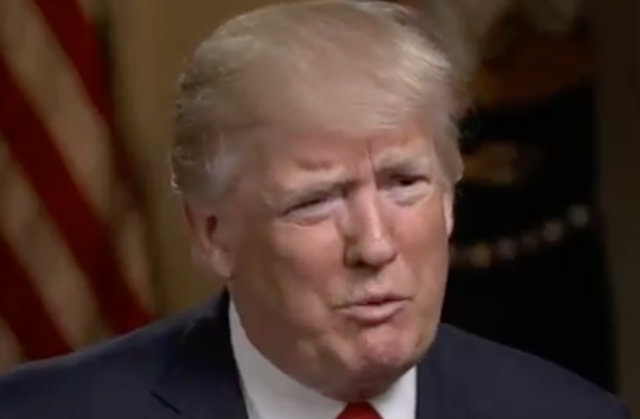
Officials at Brainerd High School got into panic mode after a quote about decapitating President Donald Trump appeared in the yearbook.
“I would like to behead him,” a sophomore said on a page that asked students what they thought of the POTUS. ” I do not like him.”
It even caught the eye of Trump supporter and actor Scott Baio, who on Friday tweeted a picture of the offending statement to the President, spokeswoman Kellyanne Conway, the FBI, and Fox News host Sean Hannity.
The U.S. Secret Service is even looking into this, WCCO reports.
Officials at the school district, located in Brainerd, Minnesota, have put out an apology for letting this quote, and others critical of the President, appear in the yearbook. They claimed they were previously unaware of the “students’ statements.”
The district does not support or otherwise endorse any disrespectful or politically based statements that are in the yearbook and apologizes for the statements that were included. While the district supports free speech, the disrespectful statements in the yearbook are contrary to the basic educational mission of the district and should not have been included in a school sponsored publication.
Now they’re reviewing existing practices that insulted in this happening.
Other quotes on the page described the President as “racist and sexist,” “seems really rude,” and “At first I thought it [his election victory] was a joke.”
LawNewz.com reached out to Professor Catherine J. Ross, who teaches over at George Washington University Law School, for her take on whether the school responded in the correct way. She explored the subject of students’ free speech in her 2015 book, Lessons in Censorship: How Schools and Courts Subvert Students’ First Amendment Rights.
“The school’s reaction to the students’ yearbook comments is not inappropriate, and is far preferable to censoring the yearbook (though the officials suggest they would have done so had they noticed the comments) or to punishing this student or other students who criticized the President or the results of the 2016 election,” she said. “Under the special doctrine that governs student speech rights, a yearbook is regarded as ‘school-sponsored speech’—speech that an observer might think bears the school’s imprimatur, or has the school’s approval. Schools may restrict speech in such publications without violating the student’s constitutional rights. And making the school’s own position on the speech clear, including disavowing it, is a better response to rude or controversial speech than censoring it.”
Don’t expect there to be any arrest in the Secret Service investigation, however. Judging by previous cases, it is highly unlikely the sophomore would be charged for the “behead” quote. To build a successful conviction, prosecutors would have to discover that the sophomore did a lot more than pop off in a yearbook interview. Consider the 1969 Supreme Court case Watts v. United States. Justices ruled for a man who allegedly threatened President Lyndon Johnson at a rally. They said his statement was merely “crude political hyperbole” in context.
“I am not going [to Vietnam],” the man said. “If they ever make me carry a rifle the first man I want to get in my sights is L.B.J.”
That same year, the court ruled for a Klan member who supported “revengeance” against the U.S. government. They held that speech is unprotected if it is both “directed at inciting or producing imminent lawless action,” and likely to succeed.
It is worth mentioning that the Secret Service reportedly investigated a gun store owner last year for selling targets with Barack Obama‘s face. He wasn’t charged.
Update – May 20, 10:07 a.m.: We added analysis from Ross on the way school officials responded.
[Screengrab via CBS]
Have a tip we should know? [email protected]